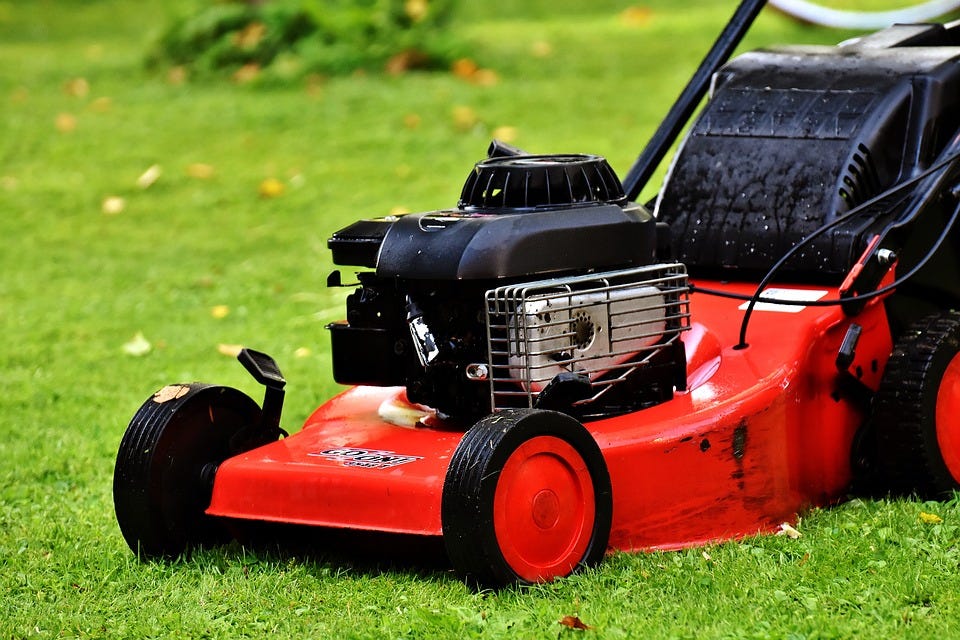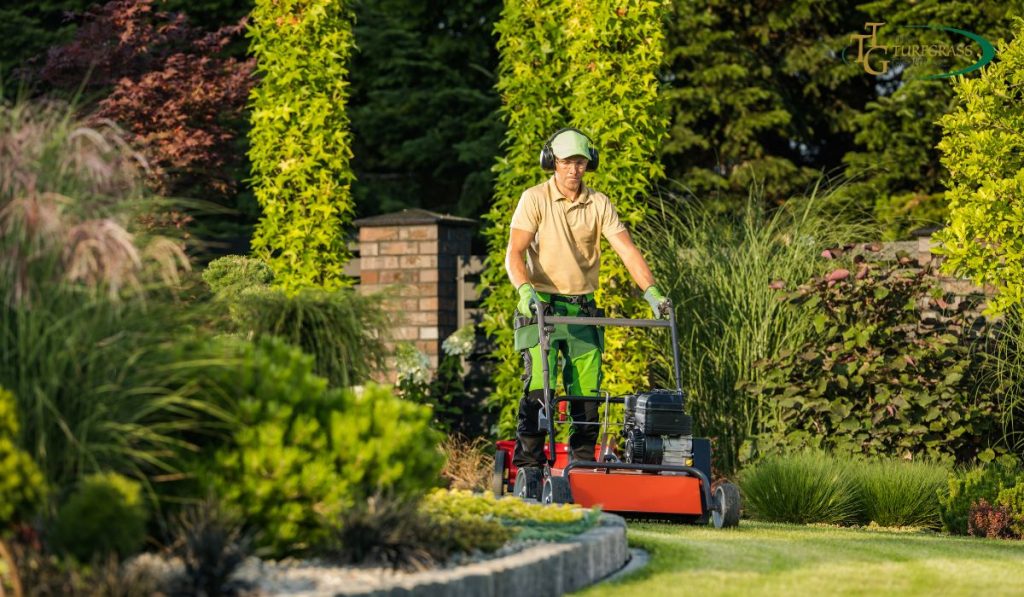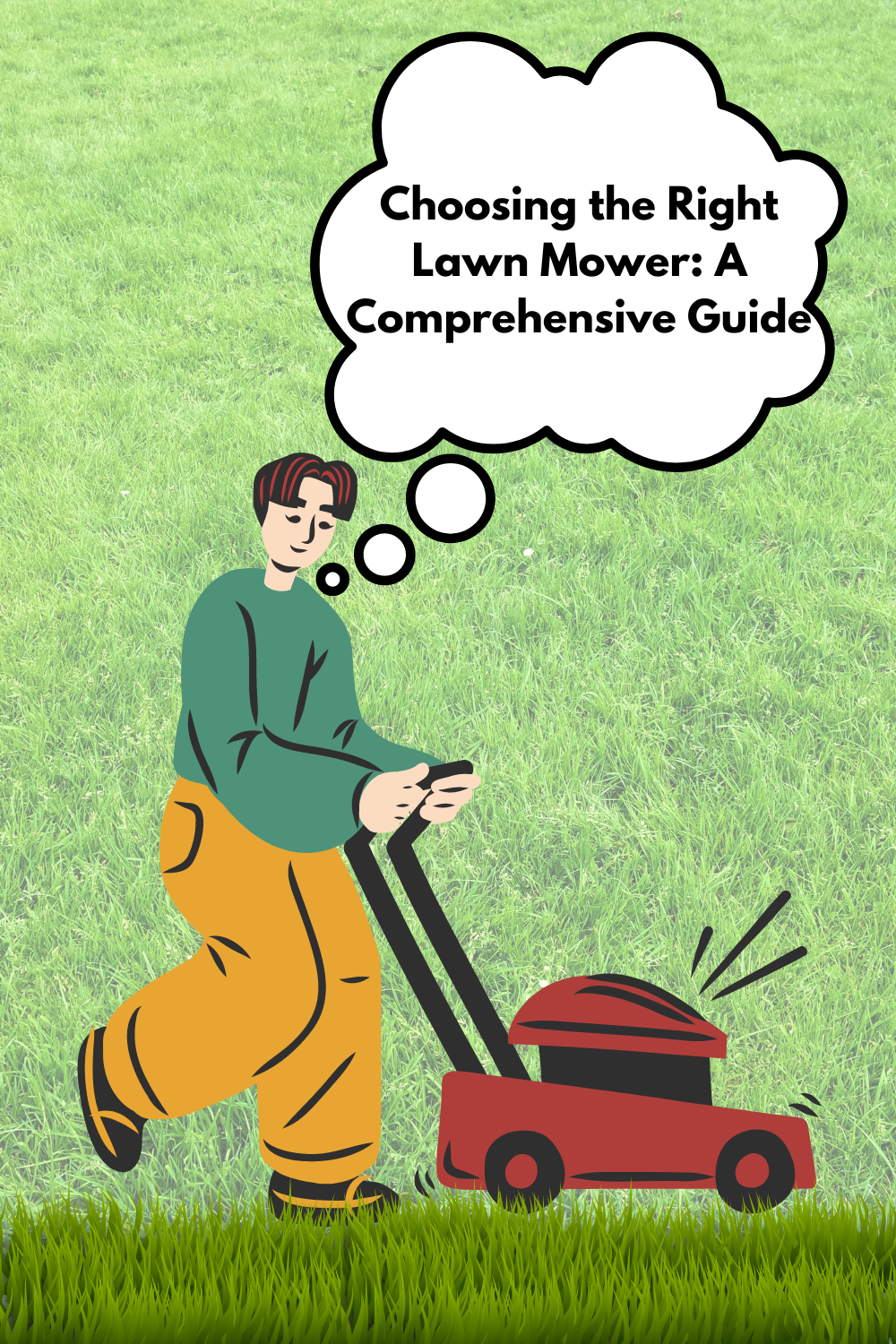Knowing How To Find The Right Land Mower can be a complex decision given the variety of options available. To find the right lawn mower, consider lawn size, terrain, and mower type (push, self-propelled, or riding). Evaluate engine power, cutting width, and ease of maintenance. Check for features like mulching, bagging, and adjustability.
1. Understand Your Lawn
Understanding your lawn is crucial for proper care, ensuring healthy growth, pest control, and water conservation. It enhances curb appeal, prevents diseases, and supports a thriving ecosystem.
- Size of the Lawn: Different mowers are suitable for different lawn sizes, e.g., small, medium, large.
- Terrain: The choice between a lawn mower suitable for flat terrain versus one designed for hilly terrain can significantly impact both the performance of the mower and the quality of your lawn care. In flat terrain, a standard push mower or a riding mower can efficiently cut grass with minimal effort. These mowers are generally less powerful but more maneuverable, making them ideal for straightforward mowing tasks. On the other hand, hilly terrain presents unique challenges that require a mower with enhanced capabilities. Mowers designed for hilly terrain typically feature stronger engines and wider wheelbases, ensuring stability and preventing tipping on slopes.
- Obstacles: When selecting a mower, considering obstacles such as trees, flower beds, and other landscape features is crucial as they can significantly impact the mower’s maneuverability and effectiveness. For instance, push mowers or smaller riding mowers are more suitable for lawns with numerous trees and flower beds. These mowers are generally more agile and can navigate tight spaces more easily, allowing you to trim grass close to obstacles without damaging them. On the other hand, larger riding mowers or zero-turn mowers might be more appropriate for expansive, obstacle-free lawns where efficiency and speed are prioritized. They are designed to cover larger areas quickly and can easily maneuver around obstacles without having to make multiple turns. Therefore, choosing the

2. Types of Lawn Mowers
The importance of different types of lawn mowers lies in their suitability for varied lawn sizes, terrains, and user needs, enhancing efficiency, convenience, and achieving a well-manicured lawn with minimal effort.
- Push Mowers: Suitable for small, flat lawns.
- Self-Propelled Mowers: Ideal for medium to large lawns with slopes.
- Riding Mowers: Best for large lawns. (e.g., lawn tractors, zero-turn mowers).
- Electric vs. Gas: Compare electric (corded and cordless) and gas-powered mowers.
- Manual Reel Mowers: Suitable for small, flat lawns with minimal grass.

3. Key Features to Consider
Key features to consider are crucial as they determine a product’s functionality, user experience, and overall value, directly impacting customer satisfaction, competitive advantage, and market success.
- Cutting Width: Wider cuts on lawn mowers cover more ground per pass, reducing the number of passes needed to mow larger lawns, which saves time and increases overall efficiency.
- Height Adjustment: Easy height adjustment allows for precise control over grass length, adapting to seasonal growth and ensuring optimal lawn health. It simplifies maintenance, promoting a lush, well-maintained appearance year-round.
- Mulching vs. Bagging: Benefits of mulching versus collecting clippings.
- Ease of Use: Consider the weight, maneuverability, and ease of starting.

4. Budget Considerations
Budget considerations are crucial for effective financial management, ensuring resources are allocated wisely, preventing overspending, enabling goal achievement, and maintaining financial stability and sustainability.
Price Range:
Prices can vary based on brand, features, and mower size. It’s important to consider long-term maintenance costs and efficiency when choosing the right mower for your needs. Here’s an overview of price ranges for different types of mowers:
- Push Mowers:
- Basic models: $100 – $300
- Self-propelled models: $250 – $500
- High-end models with features: $500 – $1,000
- Riding Mowers:
- Entry-level models (rear-engine): $1,000 – $2,000
- Mid-range models (lawn tractors): $1,500 – $3,000
- High-end models (zero-turn mowers): $2,500 – $5,000+
- Robotic Mowers:
- Basic models for smaller lawns: $800 – $1,500
- Advanced models for larger lawns: $1,500 – $3,000
- Electric Mowers:
- Corded electric mowers: $150 – $400
- Battery-powered mowers: $200 – $600
- Reel Mowers:
- Basic reel mowers: $70 – $200
- High-end reel mowers: $200 – $400
5. Environmental Impact
Environmental impact is crucial as it affects ecosystem health, biodiversity, climate stability, and human well-being. Minimizing negative impacts ensures sustainable development and preserves resources for future generations.
- Emissions: Gas mowers emit pollutants like carbon monoxide, volatile organic compounds, and nitrogen oxides, contributing to air pollution. Electric mowers produce zero emissions during operation, making them environmentally cleaner and healthier options for lawn care
- Noise Levels: In residential areas, noise levels from lawn mowers impact quality of life, sleep, and community harmony. Quieter mowers, like electric models, reduce disturbances, complying with local regulations and fostering peaceful neighborhoods
- Eco-friendly Options: Solar and battery-powered mowers offer eco-friendly alternatives to traditional gas mowers. They produce zero emissions, reducing environmental impact and promoting cleaner air quality. Additionally, they operate quietly, making them ideal for residential areas by minimizing noise disturbances

6. Brand and Warranty
Brand and warranty significantly influence consumer trust and purchasing decisions. A reputable brand ensures quality, while a strong warranty offers assurance and protection, enhancing customer loyalty and satisfaction.
Reputable Brands:
These brands are known for their quality, durability, and innovation in lawn mower technology. When choosing a mower, considering the reputation of the brand can help ensure you get a reliable and long-lasting product.
- Honda: Known for durable and powerful gas-powered mowers.
- Toro: Offers a wide range of gas, electric, and battery-powered mowers known for reliability.
- John Deere: Provides high-quality riding mowers and lawn tractors.
- Husqvarna: Offers a variety of mowers, including robotic mowers, known for their durability.
- Snapper: Known for its sturdy and reliable walk-behind and riding mowers.
- Ego: Specializes in battery-powered mowers with a reputation for performance and innovation.
- Greenworks: Offers a range of battery-powered mowers known for their efficiency and eco-friendliness.
- Cub Cadet: Offers durable and versatile riding mowers and zero-turn mowers.
- Black+Decker: Provides electric and battery-powered mowers, known for their reliability and ease of use.
- RYOBI: Offers a variety of battery-powered mowers and electric mowers with good performance.
Warranty and Support:
Warranty and customer support are crucial when buying a lawn mower. They provide assurance against defects and peace of mind. Reliable customer support ensures assistance when needed, enhancing the overall buying experience
7. User Reviews and Recommendations
User reviews and recommendations are crucial as they offer real-world insights into products and services, aiding informed decisions. They build trust, provide social proof, and help improve user experience and satisfaction.
- Customer Reviews: Check customer reviews and ratings before buying a lawn mower. They offer valuable insights into performance, reliability, and customer satisfaction, helping you make an informed decision
- Professional Reviews: Expert reviews and comparisons provide valuable insights into mower performance, features, and reliability, helping you make an informed decision based on unbiased evaluations
- Personal Recommendations: We’ve found that Honda and Toro mowers are both reliable choices for their durability and performance. They’re easy to maintain and have good customer support.
Additional Resources
- Links to Resources:

Frequently Asked Questions
To determine the right size lawn mower for your needs, consider the following factors:
Lawn Size:
Small Lawns (up to 1/2 acre): A push mower or a small electric/battery-powered mower.
Medium Lawns (1/2 to 1 acre): A self-propelled gas or electric mower.
Large Lawns (1 to 3 acres): A riding mower.
Very Large Lawns (3+ acres): A lawn tractor or a zero-turn mower.
Terrain:
Flat: Any mower type.
Hilly or Sloped: Self-propelled or riding mower with good traction.
Obstacles (trees, flower beds, etc.):
Few Obstacles: Wider cutting deck for efficiency.
Many Obstacles: Smaller cutting deck for maneuverability.
Storage Space:
Ensure you have enough storage space for the mower size you choose.
The wattage of a lawn mower you should buy depends on the size of your lawn and the type of grass you have. Here are some general guidelines:
Small Lawns (up to 1/4 acre):
Electric Mowers: 1200-1600 watts
Cordless/Battery Mowers: 36-40 volts (approximately 1000-1500 watts)
Medium Lawns (1/4 to 1/2 acre):
Electric Mowers: 1600-1800 watts
Cordless/Battery Mowers: 40-56 volts (approximately 1500-2000 watts)
Large Lawns (1/2 to 1 acre):
Electric Mowers: 1800-2000+ watts
Cordless/Battery Mowers: 56-80 volts (approximately 2000+ watts)
For larger lawns, gas-powered mowers are often more suitable.
Grass Type and Density:
Thicker or tougher grass types (e.g., Bermuda, Zoysia) may require higher wattage or a gas-powered mower for effective cutting.
Consider the power source (electric, cordless, or gas) and your specific lawn conditions to determine the appropriate wattage for your lawn mower.

